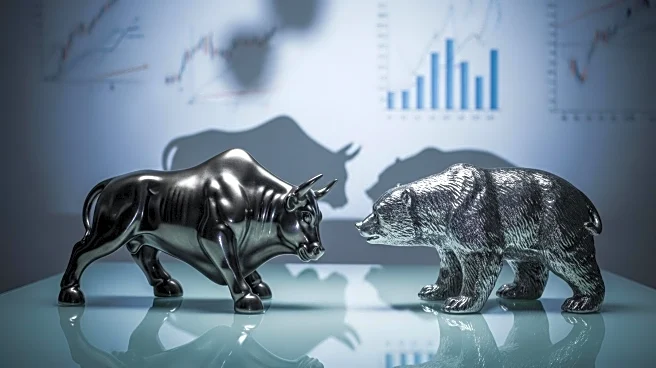What is the story about?
What's Happening?
Wall Street's primary measure of investor anxiety, the Cboe Volatility Index (VIX), experienced a significant increase, reaching a near five-month high due to renewed concerns over the U.S.-China trade conflict. The index, which reflects demand for protection against stock market declines, rose by 0.7 points to 19.68, after peaking at 22.94 earlier in the day. This rise follows a sharp selloff on Friday when the S&P 500 dropped 2.7%, marking its largest decline in six months. The market volatility was further influenced by Federal Reserve Chair Jerome Powell's comments about potentially ending the central bank's balance sheet runoff, which helped ease investor concerns over tight financial conditions.
Why It's Important?
The increase in the VIX indicates heightened investor concern about potential market instability, driven by fears surrounding the U.S.-China trade relations. This anxiety reflects broader uncertainties in the global economic landscape, which could impact U.S. businesses and investors. A higher VIX suggests that investors are seeking more protection against market downturns, potentially leading to increased costs for hedging strategies. The situation underscores the fragility of market confidence and the potential for significant economic repercussions if trade tensions escalate further.
What's Next?
Investors are likely to continue monitoring developments in U.S.-China trade negotiations closely, as any progress or setbacks could significantly influence market sentiment. The Federal Reserve's future policy decisions, particularly regarding interest rates and balance sheet management, will also be crucial in shaping investor confidence. Market participants may adjust their portfolios to mitigate risks, potentially increasing demand for protective options and influencing the VIX further. The trajectory of the VIX and market volatility will depend on these evolving economic and geopolitical factors.
Beyond the Headlines
The current market volatility highlights the interconnectedness of global economies and the impact of geopolitical tensions on financial markets. It raises questions about the long-term sustainability of market growth amid ongoing trade disputes. Additionally, the situation may prompt discussions on the effectiveness of current economic policies and the need for strategic adjustments to safeguard against future uncertainties.
















